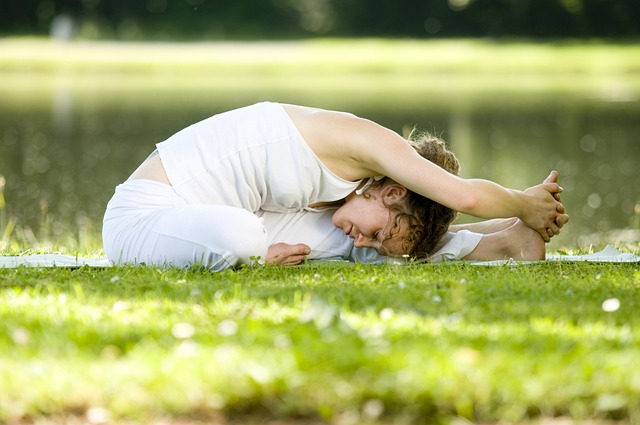# Transform Your Mind and Body: Discover How Yoga Alleviates Stress and Promotes Relaxation
In today’s fast-paced world, stress has become a common challenge for many individuals. Whether it’s the pressures of work, family responsibilities, or the constant barrage of information from social media, finding a way to alleviate stress is crucial for maintaining both mental and physical health. One powerful tool that has stood the test of time in promoting relaxation and reducing stress is yoga. This ancient practice not only transforms the body but also cultivates a calm and focused mind. In this article, we will explore how yoga alleviates stress and promotes relaxation, offering insights into its benefits and practical tips for incorporating it into your daily routine.
## The Connection Between Mind and Body
Yoga is rooted in the philosophy that the mind and body are interconnected. This holistic approach encourages individuals to develop awareness of their physical sensations, thoughts, and emotions. By practicing yoga, you learn to tune into your body, recognize stress signals, and respond with mindfulness rather than reactivity. This connection allows for greater emotional regulation and helps in managing stress more effectively.
## Physiological Benefits of Yoga
The physiological benefits of yoga are vast and contribute significantly to stress relief. When you practice yoga, your body undergoes various changes that promote relaxation:
1. **Reduction of Cortisol Levels**: Yoga has been shown to lower cortisol, the hormone associated with stress. Elevated cortisol levels can lead to a host of health problems, including anxiety, depression, and weight gain. By reducing cortisol, yoga helps create a more balanced hormonal environment.
2. **Enhanced Flexibility and Strength**: Regular yoga practice improves flexibility and builds strength. This physical transformation can lead to a greater sense of body awareness and confidence, reducing feelings of inadequacy and stress.
3. **Improved Sleep Quality**: Many people struggling with stress also experience sleep disturbances. Yoga promotes relaxation and can lead to improved sleep quality, allowing the body to recover and rejuvenate.
4. **Regulation of the Nervous System**: Yoga activates the parasympathetic nervous system, which is responsible for the body’s rest and digest functions. This activation helps counteract the fight-or-flight response triggered by stress, promoting a state of calm.
## Mental and Emotional Benefits of Yoga
Beyond the physical benefits, yoga offers significant mental and emotional advantages that contribute to stress relief:
1. **Mindfulness and Presence**: Yoga encourages mindfulness, the practice of being present in the moment without judgment. This focus on the present can help break the cycle of overthinking and anxiety, allowing for a more peaceful state of mind.
2. **Emotional Release**: The practice of yoga can facilitate emotional release. As you move through poses and focus on your breath, you may find that pent-up emotions surface. This release can be cathartic, helping to alleviate stress and promote emotional well-being.
3. **Increased Self-Acceptance**: Yoga fosters a sense of self-acceptance and compassion. As you learn to honor your body and its limitations, you cultivate a more positive self-image, which can reduce stress and anxiety related to self-criticism.
4. **Community and Connection**: Participating in yoga classes can create a sense of community and connection with others. This social aspect can provide support and encouragement, further alleviating feelings of stress and isolation.
## Incorporating Yoga into Your Daily Routine
To experience the stress-relieving benefits of yoga, it’s essential to incorporate it into your daily routine. Here are some practical tips to get started:
### Start Small
If you’re new to yoga, begin with just a few minutes each day. Even a short practice can have a significant impact on your stress levels. Gradually increase the duration as you become more comfortable.
### Choose the Right Style
There are various styles of yoga, each offering different benefits. Hatha and restorative yoga are excellent for relaxation, while vinyasa and power yoga can provide a more vigorous workout. Explore different styles to find what resonates with you.
### Create a Dedicated Space
Designate a quiet space in your home for your yoga practice. This space should be free from distractions and filled with items that promote relaxation, such as candles, plants, or soothing music.
### Incorporate Breathing Techniques
Breathwork is an integral part of yoga. Incorporate pranayama (breathing exercises) into your practice to enhance relaxation. Techniques like deep belly breathing or alternate nostril breathing can help calm the mind.
### Join a Class or Online Session
Consider joining a local yoga class or participating in online sessions. This can provide guidance from experienced instructors and foster a sense of community with fellow practitioners.
## Conclusion
In a world where stress is often unavoidable, yoga serves as a powerful antidote. By transforming both the mind and body, this ancient practice promotes relaxation, emotional well-being, and physical health. Whether you’re a seasoned yogi or a complete beginner, incorporating yoga into your daily routine can lead to profound changes in how you manage stress. Embrace the journey of self-discovery and transformation that yoga offers, and unlock the potential for a calmer, more balanced life.

